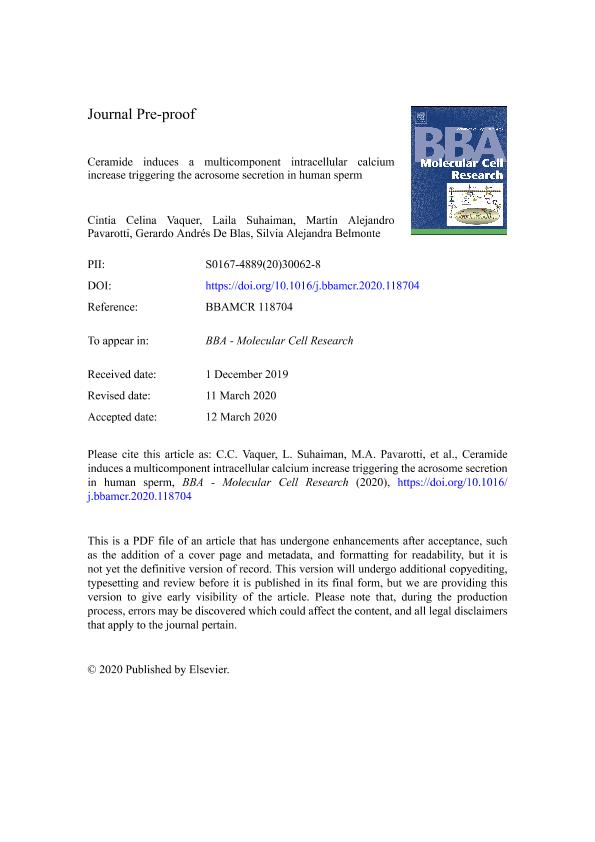Artículo
Ceramide induces a multicomponent intracellular calcium increase triggering the acrosome secretion in human sperm
Vaquer, Cintia Celina ; Suhaiman, Laila
; Suhaiman, Laila ; Pavarotti, Martin Alejandro
; Pavarotti, Martin Alejandro ; de Blas, Gerardo Andrés
; de Blas, Gerardo Andrés ; Belmonte, Silvia Alejandra
; Belmonte, Silvia Alejandra
 ; Suhaiman, Laila
; Suhaiman, Laila ; Pavarotti, Martin Alejandro
; Pavarotti, Martin Alejandro ; de Blas, Gerardo Andrés
; de Blas, Gerardo Andrés ; Belmonte, Silvia Alejandra
; Belmonte, Silvia Alejandra
Fecha de publicación:
07/2020
Editorial:
Elsevier Science
Revista:
Biochimica et Biophysica Acta-Molecular Cell Research
ISSN:
0167-4889
Idioma:
Inglés
Tipo de recurso:
Artículo publicado
Clasificación temática:
Resumen
Exocytosis of spermatozoon's secretory vesicle, named acrosome reaction (AR), is a regulated event that plays a central role in fertilization. It is coupled to a complex calcium signaling. Ceramide is a multitasking lipid involved in exocytosis. Nevertheless, its effect on secretion is controversial and the underlying cellular and molecular mechanisms remain unknown. Human spermatozoa are useful to dissect the role of ceramide in secretion given that the gamete is not capable to undergo any trafficking mechanisms other than exocytosis. We report for the first time, the presence of sphingolipid metabolism enzymes such as neutral-sphingomyelinase and ceramide synthase in sperm. Ceramidases are also present and active. Both the addition of cell-permeable ceramide and the rise of the endogenous one, increase intracellular calcium acting as potent inducers of exocytosis. Ceramide triggers AR in capacitated spermatozoa and enhances the gamete response to progesterone. The lipid induces physiological ultrastructural changes in the acrosome and triggers an exocytosis-signaling cascade involving protein tyrosine phosphatase 1B and VAMP2. Real-time imaging showed an increment of calcium in the cytosol upon ceramide treatment either in the absence or in the presence of extracellular calcium. Pharmacological experiments demonstrate that at early stages the process involves ryanodine receptors, CatSper (calcium channel of sperm), and store-operated calcium channels. We set out the signaling sequence of events that connect ceramide to internal calcium mobilization and external calcium signals during secretion. These results allow the coordination of lipids and proteins in a pathway that accomplishes secretion. Our findings contribute to the understanding of ceramide's role in regulated exocytosis and fertilization.
Palabras clave:
ACROSOME REACTION
,
CALCIUM
,
CERAMIDE
,
EXOCYTOSIS
,
LIPID SIGNALING
,
SPERM
Archivos asociados
Licencia
Identificadores
Colecciones
Articulos(ICB)
Articulos de INSTITUTO INTERDISCIPLINARIO DE CIENCIAS BASICAS
Articulos de INSTITUTO INTERDISCIPLINARIO DE CIENCIAS BASICAS
Articulos(IHEM)
Articulos de INST. HISTOLOGIA Y EMBRIOLOGIA DE MEND DR.M.BURGOS
Articulos de INST. HISTOLOGIA Y EMBRIOLOGIA DE MEND DR.M.BURGOS
Citación
Vaquer, Cintia Celina; Suhaiman, Laila; Pavarotti, Martin Alejandro; de Blas, Gerardo Andrés; Belmonte, Silvia Alejandra; Ceramide induces a multicomponent intracellular calcium increase triggering the acrosome secretion in human sperm; Elsevier Science; Biochimica et Biophysica Acta-Molecular Cell Research; 1867; 7; 7-2020; 1-76
Compartir
Altmétricas



